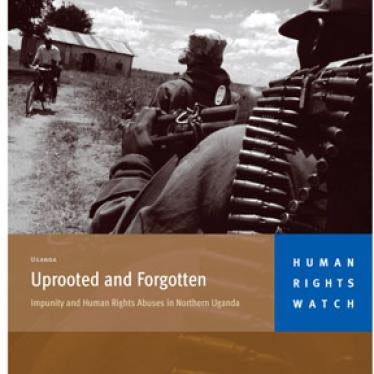(New York) - As the Ugandan government and the Lord’s Resistance Army (LRA) take the welcome step of resuming peace talks tomorrow, the negotiations must seek an outcome that also ensures fair and credible prosecutions for the most serious crimes in northern Uganda. Such prosecutions, along with broader accountability measures for lesser abuses, are crucial to achieving a sustainable peace in northern Uganda.
The talks, which began last July but broke down in December, are scheduled to resume in Juba, the regional capital of southern Sudan. During the 21-year conflict, civilians have suffered heinous crimes and mass displacement.
"Over the past two decades, the LRA leadership has been responsible for shocking crimes against civilians, while the Ugandan military forces have also been implicated in serious human rights abuses," said Richard Dicker, director of Human Rights Watch's International Justice Program. "Ensuring justice for the most serious crimes is critical to achieve the durable peace sought by the people of northern Uganda."
International law requires prosecutions for serious crimes such as crimes against humanity and war crimes. But prosecution for the most serious crimes is more than a legal obligation. Such prosecutions send the message, especially to would-be perpetrators, that no one is above the law. This helps to consolidate respect for the rule of law, which in turn helps cement peace and stability, Human Rights Watch said.
In 2005, the International Criminal Court (ICC) issued warrants for five senior LRA leaders for war crimes and crimes against humanity. These arrest warrants are an important step toward ensuring justice is done, Human Rights Watch said. The LRA leaders have sought to avoid trial at the ICC and present the warrants as an impediment to achieving peace.
"Impunity would only help fuel future abuses in Uganda," said Dicker. "By painting the ICC as an obstacle to peace, the LRA leaders have been trying to turn reality upside down."
Every effort must also be made to investigate and prosecute alleged human rights violations committed by the Ugandan military. In addition, broader accountability for less serious offenses through trials, a truth-telling process and, where appropriate, traditional mechanisms is an important component of sustainable peace.
Some involved with the peace talks are working to identify alternatives to ICC trials as a way to help facilitate the signing of a peace agreement. Such proposals may involve a combination of national judicial proceedings and traditional justice measures.
The ICC treaty allows for ICC cases to be tried in Uganda, but only if certain criteria are met. A state must be genuinely able and willing to conduct the investigation or prosecution, which requires that proceedings are independent and impartial. In addition, proceedings cannot be conducted in a way that is inconsistent with an intent to bring a person to justice.
"The ICC's charges against LRA leaders are of the utmost gravity," said Dicker. "National prosecutions would need to involve both fair trials and penalties that reflect the gravity of the crimes committed. Anything less would be justice denied."
Whether the necessary criteria are met to allow ICC cases to be tried domestically is a determination that must ultimately be made by the ICC judges.
While the Security Council could defer the ICC's investigation or prosecution in northern Uganda for 12 months under article 16 of the ICC statute, this would be inappropriate, Human Rights Watch said. In the absence of credible alternatives at the national level, a deferral would shield LRA leadership from prosecution, perhaps indefinitely if renewed. It could also open the door to dangerous interference by the Security Council in the judicial operations of the ICC.
Human Rights Watch called attention to the continued risks posed by the conflict to the civilian populations of northern Uganda and southern Sudan. The announcements on April 15 to renew the cessation of hostilities agreement and also to enhance the cessation of hostilities monitoring team were positive developments, Human Rights Watch said. Human Rights Watch called on the parties and mediators to ensure that the cessation of hostilities monitoring team immediately investigates credible allegations of attacks on civilians and that humanitarian assistance reached affected communities.
Background
The conflict in northern Uganda to depose President Yoweri Museveni began immediately after he took power by force in 1986. In December 2003, Museveni invited the ICC to investigate the LRA. In July 2005, the court issued warrants for the arrest of the top five LRA leaders - Joseph Kony, Vincent Otti, Okot Odhiambo, Raska Lukwiya and Dominic Ongwen - for crimes against humanity, including widespread or systematic murder, sexual enslavement and rape, and war crimes such as intentionally attacking civilians and abducting and enlisting children under the age of 15. Lukwiya was killed in August during a fight between the LRA and Ugandan military forces.
|
News Release
Uganda: Resumption of Juba Peace Talks Welcome
Credible Prosecutions for Most Serious Crimes Key to Durable Peace
Your tax deductible gift can help stop human rights violations and save lives around the world.
Most Viewed
-
February 4, 2026
China: Repression Deepens, Extends Abroad

-
November 25, 2019
A Dirty Investment

-
March 29, 2021
“Everything I Have to Do is Tied to a Man”

-
November 12, 2018
“Shall I Feed My Daughter, or Educate Her?”

-
March 31, 2022
Iran: Women Blocked From Entering Stadium



